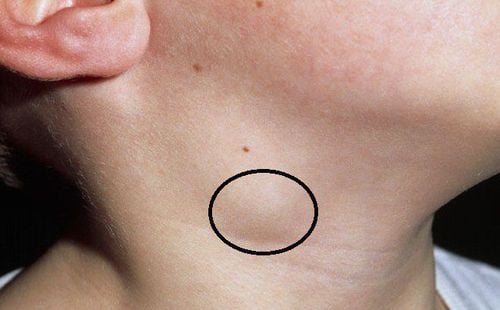This is an automatically translated article.
The article was professionally consulted by Specialist Doctor I Le Thien Quang - Internal Oncologist - Department of Medical Examination & Internal Medicine - Vinmec Da Nang International HospitalNasopharyngeal cancer is one of the ten most common types of cancer today with a very high mortality rate. On average, about 20-50 people have nasopharyngeal cancer for every 100,000 people (statistics in epidemiological areas). Around this disease, many people wonder if nasopharyngeal cancer is contagious? What causes throat cancer? Join us to find the answer in the article below.
1. What is nasopharyngeal cancer?
Nasopharyngeal cancer is a malignant disease that occurs in the oropharynx - the highest part of the pharynx. The disease can affect anyone, at any age, but is most common in men between the ages of 30 and 60. Symptoms of nasopharyngeal cancer include:
Sore throat accompanied by difficulty breathing Frequent stuffy nose, nosebleeds Migraine headaches Tinnitus, ear pain Unusual mass in the throat Many people often confuse the symptoms This symptom with common diseases such as headache, sore throat, runny nose... Therefore, nasopharyngeal cancer is often detected late. To check if you have nasopharyngeal cancer, you need an ENT exam and diagnostic biopsy.
2. Thought the flu turned out to be nasopharyngeal cancer
When newly formed, nasopharyngeal cancer often shows signs of many diseases related to otolaryngology such as colds or flu or medical diseases of nerves and blood vessels. Patients often subjectively ignore the early symptoms of the disease because they think they only have the flu or common sinusitis.First, you feel sore throat, difficulty swallowing. Difficulty hearing in one ear or both. You may also experience nosebleeds, headaches, blurred vision, sneezing, ringing in your ears, headaches, and persistent hoarseness. If the above symptoms persist for 3 weeks without improvement, you should see your doctor for cancer screening.
When cancer develops in the final stage, you often have a stuffy nose with bleeding and pus in your nose; lymphadenopathy at the angle of the jaw can be perceived sensory; or paralysis of cranial nerves with signs such as crossed eyes, facial numbness, tongue twisting, choking...

3. Eating a lot of fermented foods such as pickles and salted eggplants increases the risk of nasopharyngeal cancer
To answer the question of whether throat cancer is contagious, we first need to understand what causes the disease? Currently, the cause of oropharyngeal cancer has not been found exactly and specifically, but people have found factors that increase the risk of this disease such as:People with HPV virus and EBV virus People Eat a lot of fermented foods: pickles, salted eggplant Genetic factors are also considered as one of the causes of oropharyngeal cancer. Many studies show that people who have close relatives (father, mother, siblings...) with nasopharyngeal cancer have a higher risk of developing the disease than the general population.
4. Is throat cancer contagious?
With the danger and increasing prevalence of oropharyngeal cancer, many people fear that the disease can be transmitted from person to person. So, is it contagious if you come into contact with someone with oropharyngeal cancer? The answer is no.Nasopharyngeal cancer is not contagious, so there is no direct transmission. The disease can only be transmitted indirectly through the HPV virus - the virus that increases the risk of infection. HPV virus can be transmitted through sexual contact with an infected person, oral sex.
5. How to prevent throat cancer
Although nasopharyngeal cancer is not directly transmitted and the exact cause of the disease has not been found, you can prevent the disease with the following notes:Definitive treatment of ear - nose related diseases - throat, do not let the disease recur many times. Moderate living, work and reasonable rest. Limit the intake of fermented foods such as salted tomatoes, pickles. Avoid eating fast food and foods that contain a lot of preservatives. Limit alcohol, beer, tobacco. Do not use stimulants.

Listen to your body to detect abnormalities early. Periodic health check-up every 6-12 months. In order to detect and diagnose nasopharyngeal cancer promptly, in order to have appropriate treatment measures, Vinmec International General Hospital has a package of screening and early detection of oropharyngeal, hypopharyngeal, and laryngeal cancers, including full range of services needed to help early detection of nasopharyngeal cancer. Detect other abnormalities in the arch - hypopharynx - larynx area.
The following subjects at risk of oropharyngeal cancer should screen for cancer early to detect the disease in time::
Customers with a family history of oropharyngeal cancer, Customers who smoke, drink a lot. Customers with frequent abnormal symptoms: nosebleeds, headaches, ringing in the ears, stuffy nose, lymphadenopathy in the neck... Customers wishing to have regular check-ups to screen for nasopharyngeal cancer throat.
Please dial HOTLINE for more information or register for an appointment HERE. Download MyVinmec app to make appointments faster and to manage your bookings easily.














